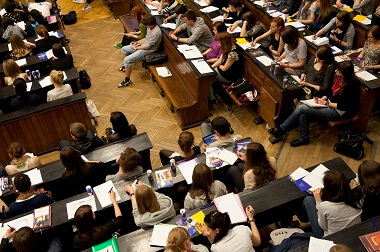Research Seminars

PhD student should take part in a seminar at the Faculty or in the external institution. The selection of the seminar should be in agreement with the supervisor. Seminars are not provided by the Doctoral School. PhD student should sign up for the seminar according to the rules applicable to a given course (registration in the USOS is not always possible).
The discipline coordinator is responsible for entering in USOS the credit for the course Research Seminar I (1700-SZD-SEM) after the PhD student has provided information that he/she accomplished the course. To get a credit you have to meet the following conditions:
– report your credit within the proper time period – up to the end of the make-up exam session in a semester which the course is realized in,
– present the transcript of records (or the external seminar form),
– mention the courses which you want to use to get a credit.
You should register in USOS for 1700-SZD-SEM-I-30 hours or 1700-SZD-SEM-I-60 hours depending on your choice for the current academic year. You are obliged to attend 60 hours of seminars until the end of the second year.
List of discipline coordinators and some Research Seminars to choose:
Astronomy – coordinator dr hab. Dorota Rosińska, prof ucz.
– Research seminar – Tuesday, 16:00
Biology – coordinator dr hab. Marta Wrzosek, prof ucz.
– seminars in research groups under the supervision of the supervisor
– institute seminars of the Faculty of Biology
– seminars of Centre of New Technologies UW (CENT)
Chemistry – dr Joanna Szawkało
Each PhD student will participate in specialist research seminars related to the department that covers the subject of the doctoral dissertation. This seminar is dedicated do PhD students and takes place as a part of a research group in which the PhD student realizes doctoral project. The seminar can also be held in the Research Laboratory or the Didactic Department. Completion of the seminar is on the basis of the presence and a presentation or a paper,at least once per year, in English.
Physics – coordinator prof. Andrzej Twardowski
– Atmospheric Physics Seminar
– Proseminar „The Algebra & Geometry of Modern Physics”
– Seminar ‚Soft Matter and Statistical Physics’
– Seminar „Modeling of Complex Systems”
– Seminar „Trends in modern physics”
– Seminar „Algebry operatorów i ich zastosowania w fizyce”
– Seminar „Fizyka jądra atomowego”
– Seminar „Fizyka materii skondensowanej”
– Seminar „Fizyka wysokich energii”
– Seminar „Kwantowa informacja”
– Seminar „Metody geometryczne”
– Seminar „Nieliniowość i Geometria”
– Seminar „Struktura Materii Skondensowanej”
– Seminar „Ścisłe rezultaty teorii kwantów i grawitacji”
– Seminar „Teoria cząstek elementarnych i kosmologii”
– Seminar „Teoria dwoistości”
– Seminar „Teoria względności”
– Seminarium biofizyki oraz projektowania molekularnego i bioinformatyki
– Seminarium dydaktyki i popularyzacji fizyki
– Seminarium fizyki biomedycznej
– Seminarium fizyki ciała stałego
– Seminarium fizyki litosfery i planetologii
– Seminarium fizyki półprzewodników
– Seminarium fotoniki
– Seminarium optyczne
– Środowiskowe seminarium nauk o widzeniu
Mathematics – coordinator prof. dr hab. Rafał Latała
– Research Seminar „ Geometria Algebraiczna”, Adrian Langer i Jarosław Wiśniewski
– Research Seminar „Geometra”, Maria Moszyńska
– Research Seminar „Logika matematyczna” Zofia Adamowicz, Leszek Kołodziejczyk, Konrad Zdanowski
– Research Seminar „Teoria kategorii”, Marek Zawadowski
– Research Seminar „Topologia algebraiczna”, Marcin Chałupnik, Andrzej Weber, Krzysztof Ziemiański
– Research Seminar „Topologia i teoria mnogości”, Witold Marciszewski, Piotr Zakrzewski
– Seminarium badawcze Zakładu Teorii Prawdopodobieństwa, Rafał Latała
– Seminarium badawcze Zakładu Algebry, Jan Okniński
– Seminarium badawcze Zakładu Analizy Numerycznej, Leszek Plaskota
– Seminarium badawcze Zakładu Biomatematyki i Teorii Gier, Mirosław Lachowicz
– Seminarium badawcze Zakładu Logiki, Hung Son Nguyen, Marcin Szczuka, Dominik Ślęzak
– Seminarium badawcze Zakładu Równań Fizyki Matematycznej, Grzegorz Łukaszewicz
– Seminarium Zakładu Statystyki Matematycznej: „Łańcuchy Markowa i metody Monte Carlo”, Wojciech Niemiro
– Seminarium badawcze Zakładu Układów Dynamicznych, Henryk Żołądek
– North Atlantic Noncommutative Geometry Seminar, organizers: Paul F. Baum, Ludwik Dabrowski, Soren Eilers, Piotr M. Hajac (IMPAN), Frederic Latremoliere, Tomasz Maszczyk,
Ryszard Nest, Marc A. Rieffel, Wojciech Szymański
– Teoria liczb, organizers: Jakub Byszewski (UJ Kraków), Bartosz Naskręcki (UAM Poznań), Masha Vlasenko oraz Alex Youcis (IMPAN)
– Seminarium Centrum Dioscuri w Topologicznej Analizie Danych, organizer: Pawel Dłotko (IMPAN)
– Geometry and Differential Equations Seminar, organizer: Maciej Dunajski, Janusz Grabowski, Bronisław Jakubczyk, Wojciech Kryński, Paweł Nurowski
– Seminarium online z teorii osobliwości, organizer: Michał Farnik, Zbigniew Jelonek (IMPAN), Piotr Migus
– Statystyka matematyczna i inne zastosowania probabilistyczne, organizer: Piotr Jaworski (MIMUW), Marek Męczarski (SGH), Tomasz Rychlik (IMPAN)
– Grupa robocza z zastosowań teorii mnogości, organizer: Piotr Koszmider (IMPAN)
– Seminar in Geometric Function and Mapping Theory, organizer: Tomasz Adamowicz (IMPAN)
Computer sciences – coordinator prof. dr hab. Rafał Latała
– Seminar „Algorytmika” , Marcin Pilipczuk i Piotr Sankowski
– Seminar „Biologia obliczeniowa i bioinformatyka” , Norbert Dojer, Anna Gambin, Paweł Górecki, Jerzy Tiuryn, Bartek Wilczyński
– Seminar „Gry, mechanizmy i sieci społeczne”, Marcin Dziubiński, Tomasz Michalak
– Seminar „Teoria automatów”, Mikołaj Bojańczyk, Damian Niwiński
– „Uczenie maszynowe” Przemyslaw Biecek, Piotr Biliński, Marek Cygan
– „Systemy komputerowe” , Konrad Iwanicki, Krzysztof Rządca
Earth and Environmental Sciences– coordinator dr hab. Sebastian Kowalczyk, prof. ucz.
Seminaria:
– Seminar in Earth and Environmental Sciences for PhD students, Anna Żylińska
– Katedry Geochemii, Mineralogii i Petrologii
– Katedry Geologii Basenów Sedymentacyjnych
– Katedry Geologii Historycznej, Regionalnej i Paleontologii
– Katedry Geologii Inżynierskiej i Geomechaniki
– Katedry Geologii Klimatycznej
– Katedry Geologii Złożowej i Gospodarczej
– Katedry Hydrogeologii i Geofizyki
– Katedry Ochrony Środowiska i Zasobów Naturalnych
– Katedry Tektoniki i Kartografii Geologicznej